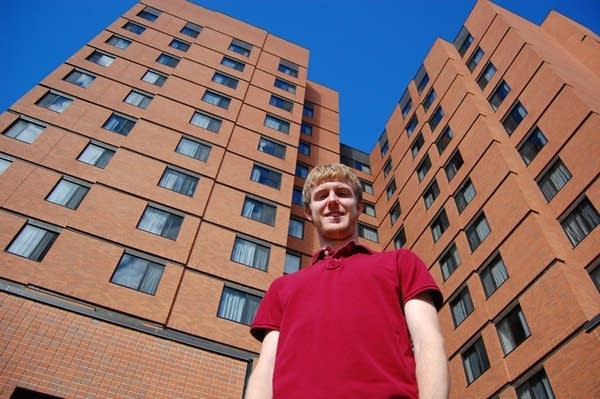U of M volunteers keeping students informed about H1N1

About 100 University of Minnesota students are turning up with suspected cases of H1N1 every week; however most of those influenza cases aren't identified by doctors or nurses, but rather by student volunteers called health advocates.
The volunteers have offered health advice to their fellow students for 20 years, but this is the first widespread illness they've dealt with.
Benjamin Davis, 19, assured me he's been without a fever for over 24 hours.
But just to be safe, we didn't shake hands or sit too close as we sat down to talk in a student lounge at Middlebrook Hall on the University of Minnesota campus.
Create a More Connected Minnesota
MPR News is your trusted resource for the news you need. With your support, MPR News brings accessible, courageous journalism and authentic conversation to everyone - free of paywalls and barriers. Your gift makes a difference.
"My nose is much improved actually from a couple of days ago when I could hardly breathe through it at all," Davis said between sniffles. "So I'm feeling a lot better but I still am a little stuffed with a little bit of a cough."
Davis, a sophomore music major from Oskaloosa, Iowa, had spent several days fighting what health officials say is an "influenza-like illness".
The experience started four days earlier with a sore throat, and then he developed a runny nose and a fever. He sought help from the health advocate in his dorm, one of about 65 such student volunteers on campus.
They took his temperature and found it was over 100 degrees. That was the tip off. The "influenza-like illness" was most likely H1N1.

"They basically told me to isolate myself in my room, not go to any classes, let all my teachers know and just rest and try and get better as soon as possible," he said.
That's the same advice Annmarie Bodnia hands out to students sick with H1N1 at Comstock Hall. Bodnia is equipped with a messenger bag filled with thermometers, Tylenol to help alleviate fevers and cough syrup.
"They're individual packs, so we can just hand them out," she said. "It's sterile and we don't have to measure anything out it's pre-done for us. So that's nice.
Bodnia, an 18-year-old freshman, sees at least a couple of students a week with a fever, sore throat and body aches, tell-tale symptoms of H1N1.
Her job is to help slow the spread of the flu virus by encouraging students to stay out of the classroom for at least 24 hours after their fever breaks, even if they don't feel sick.
The health advocates also provide the university's health leaders with valuable information about the spread of H1N1.

"Usually we think of the folks in our clinic as the front lines," said Dave Golden, director of Public Health at the University of Minnesota. "But these guys are actually in front of the front lines, they're right there in the residential halls."
Golden said health advocates keep students from making unnecessary trips to the campus clinic or the emergency room.
"I think it slows down our calls and the people showing up at our front door to help stem some of the over excitement that can happen sometimes," he said.
The U's health advocates have been trained to handle any number of health issues, but Annemarie Bodnia said this year they may have gotten more than they bargained for.
"When I signed up I was thinking it would be kind of cool to have the experience of having my peers come to me for advice and I've always been a very open person," she said. "I didn't know that I was signing up for a pandemic."
Bodnia said the H1N1 outbreak provides great experience for her future plans of attending nursing school.
